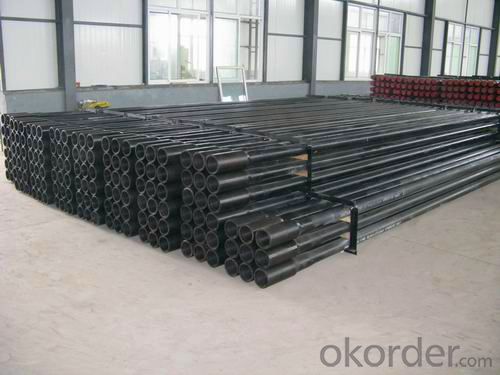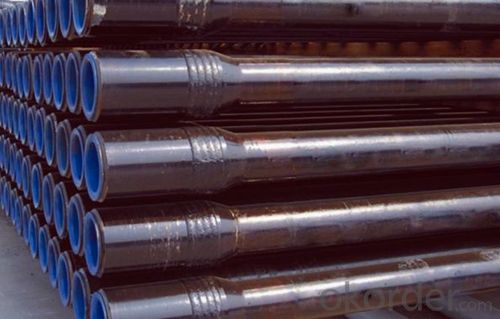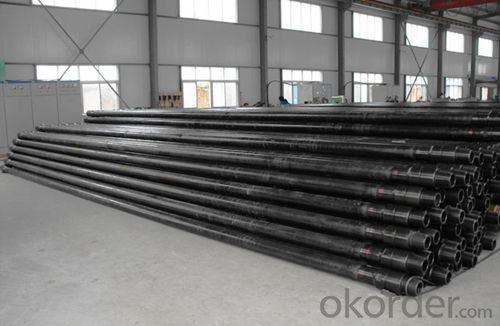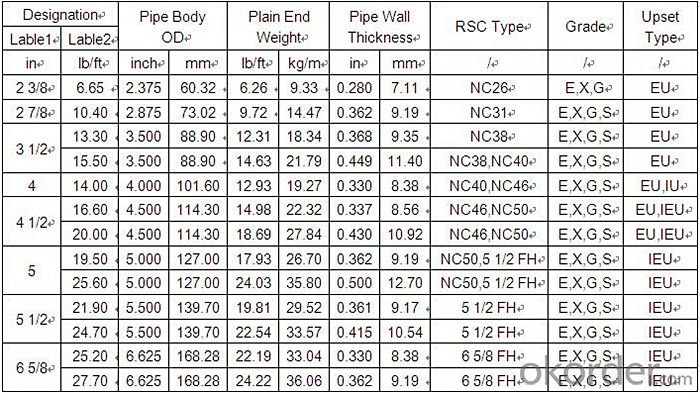Oil Drill Pipe with API Spec 5DP Standard
- Loading Port:
- Tianjin
- Payment Terms:
- TT OR LC
- Min Order Qty:
- 20 m.t.
- Supply Capability:
- 1000 m.t./month
OKorder Service Pledge
OKorder Financial Service
You Might Also Like
1. Structure of Oil Drill Pipe Description
We can supply all kinds of drill pipes that are consistent with API SPEC 5DP. Advanced drill pipe production lines can transfer the welding parameters to the best position to ensure the quality of welding zone; the heat treatment process with the feature of internal and external cooling at the same time can make a more reliable and stable mechanical character. Application of automatic weight, length measurement and automatic spray records can ensure products' traceability. Application of thickening and heating lines and 1250 tons of upsetting machine can ensure the thickening size meet the standard of API SPEC 5DR Using of CN furnace for whole pipe body heating and quenching, tempering machine's advanced heat treatment process can ensure the pipe's mechanical character. Tube hydraulic straightening machine ensures the straightness and coaxiality of pipe body.
2. Main Features of Oil Drill Pipe
1) Advanced test for quality
2) MTC provided
3) API Standard
3. Oil Drill Pipe Images



4. Oil Drill Pipe Specification

5. FAQ of Oil Drill Pipe
We have organized several common questions for our clients,may help you sincerely:
①How about your company?
One of the leading manufacturers and suppliers specializing in drill pipe products in China, mainly offering drill pipes including oil drill pipe, water well drill pipe, flat drill pipe, geological drill pipe and non-dig drill pipe.
Other than drill pipes we are also capable of supplying a wide variety of pipeline accessories, drill joints, steel pipe fittings, valves etc. consists of our one-stop sales. The integrated sales & service ensures customers with various demands an easier access for purchasing management.
②How to guarantee the quality of the products?
We have established the international advanced quality management system,every link from raw material to final product we have strict quality test;We resolutely put an end to unqualified products flowing into the market. At the same time, we will provide necessary follow-up service assurance.
③How long can we receive the product after purchase?
In the purchase of product within three working days, We will arrange the factory delivery as soon as possible.
- Q:How do you determine the pipe schedule for steel pipes?
- The pipe schedule for steel pipes is determined based on various factors such as the pipe's nominal size, wall thickness, and the application requirements. The pipe schedule is a standardized system that indicates the thickness of the pipe's wall, which affects its pressure rating and suitability for different applications. Factors like the fluid type, temperature, and pressure it will be subjected to help determine the appropriate pipe schedule to ensure safe and efficient operation.
- Q:What is the lifespan of a steel pipe?
- The lifespan of a steel pipe can vary depending on several factors such as the quality of the pipe, the environment it is exposed to, and how well it is maintained. However, on average, a properly installed and maintained steel pipe can last anywhere from 20 to 50 years.
- Q:Are steel pipes suitable for chemical processing plants?
- Yes, steel pipes are suitable for chemical processing plants. Steel pipes have excellent strength and durability, making them resistant to corrosion and able to withstand high pressure and temperature conditions common in chemical processing plants. Additionally, steel pipes can be easily welded, offering flexibility in design and installation.
- Q:What are the different types of thread connections used in steel pipes?
- The different types of thread connections used in steel pipes include tapered threads such as NPT (National Pipe Thread), BSPT (British Standard Pipe Taper), and API (American Petroleum Institute) threads. There are also parallel threads like BSP (British Standard Pipe) and G (ISO 228-1). These thread connections are used to join and seal steel pipes in various industries and applications.
- Q:Can steel pipes be used for conveying liquids and gases?
- Yes, steel pipes can be used for conveying both liquids and gases. They are commonly used in industries such as oil and gas, water supply, and sewage systems due to their durability, strength, and resistance to corrosion.
- Q:How do steel pipes handle seismic expansion joints?
- Steel pipes handle seismic expansion joints by allowing for movement and flexibility. These pipes are designed to withstand the forces caused by seismic activity, such as earthquakes, by accommodating expansion and contraction without causing damage to the overall structure. The joints in steel pipes are often equipped with specialized components, such as bellows or flexible couplings, that can absorb the movement and prevent excessive stress on the pipeline. This ensures the integrity and safety of the pipeline system during seismic events.
- Q:What is the role of steel pipes in the food processing industry?
- Steel pipes play a crucial role in the food processing industry as they are used for various applications such as conveying fluids, gases, and other materials throughout the production process. These pipes are resistant to corrosion, have high strength, and can withstand extreme temperatures, making them ideal for transporting food products safely and hygienically. They are widely used for transporting water, steam, and other liquids, as well as for transferring ingredients, such as grains, oils, and sauces. Additionally, steel pipes are utilized in the construction of food processing equipment, such as mixers, blenders, and storage tanks, ensuring the durability and integrity of the entire production system.
- Q:How do you determine the weight per foot of a steel pipe?
- To determine the weight per foot of a steel pipe, you need to know its outer diameter, wall thickness, and the density of steel. Using these measurements, you can calculate the cross-sectional area of the pipe, which is then multiplied by the length of the pipe to find its volume. Finally, multiplying the volume by the density of steel gives you the weight per foot of the steel pipe.
- Q:How do you protect steel pipes from fire?
- To protect steel pipes from fire, there are several measures that can be taken. One commonly used method is to apply fire-resistant coatings or paints to the surface of the pipes. These coatings or paints are designed to withstand high temperatures and provide a barrier that prevents the heat from reaching the steel. Another effective way to protect steel pipes from fire is to wrap them with fire-resistant insulation materials. These materials act as a buffer, reducing the heat transfer and slowing down the spread of fire. Insulation materials such as mineral wool or ceramic fiber blankets are commonly used for this purpose. In addition, it is important to ensure that the steel pipes are properly installed and supported. This includes maintaining proper clearance from other flammable materials and avoiding overcrowding or obstructions that could impede the flow of air around the pipes. Adequate spacing between pipes is also crucial to prevent the transfer of heat from one pipe to another. Furthermore, it is recommended to incorporate firestop systems when steel pipes pass through fire-rated walls or floors. Firestop systems consist of fire-resistant materials and seals that prevent the spread of fire and smoke through openings or penetrations in fire-rated barriers. Regular maintenance and inspections are essential to ensure the ongoing effectiveness of the fire protection measures. Any damage or deterioration of the coatings, insulation, or firestop systems should be promptly repaired or replaced to maintain the fire resistance of the steel pipes. Overall, a combination of fire-resistant coatings, insulation, proper installation, and maintenance practices are crucial in protecting steel pipes from fire hazards. These measures help to minimize the risk of fire-related damage and ensure the safety of both the pipes and the surrounding environment.
- Q:How do you prevent steel pipes from freezing?
- To avoid freezing of steel pipes, there are several actions that can be taken: 1. Insulate the pipes: Utilize foam insulation sleeves or wrap the pipes with insulation tape. This will help maintain the temperature of the pipes and prevent freezing. 2. Seal any gaps or cracks: Examine the area surrounding the pipes and seal any gaps or cracks using caulk or expanding foam. This will prevent cold air from entering and causing freezing. 3. Install heat cables: Wrap heat cables around the steel pipes to provide a constant source of warmth. These cables can be controlled by a thermostat, ensuring that the pipes remain above freezing temperature. 4. Maintain above-freezing temperature: In regions with severe cold weather, it is recommended to keep the indoor temperature above freezing, even if the property is unoccupied. This will help maintain a suitable temperature for the pipes and prevent freezing. 5. Open cabinets and faucets: During extremely cold weather, open cabinet doors in kitchens and bathrooms to allow warm air to circulate around the pipes. Additionally, allowing faucets to drip slightly can keep water flowing and prevent freezing. 6. Drain the pipes: If the property will be vacant during freezing weather, it is advisable to completely drain the pipes. This can be achieved by shutting off the main water supply and opening all faucets until no water remains. This minimizes the risk of freezing and potential damage. Remember, taking preventive measures is vital in safeguarding steel pipes against freezing. By implementing these actions, you can significantly reduce the chances of frozen pipes and costly repairs.
1. Manufacturer Overview |
|
|---|---|
| Location | |
| Year Established | |
| Annual Output Value | |
| Main Markets | |
| Company Certifications | |
2. Manufacturer Certificates |
|
|---|---|
| a) Certification Name | |
| Range | |
| Reference | |
| Validity Period | |
3. Manufacturer Capability |
|
|---|---|
| a)Trade Capacity | |
| Nearest Port | |
| Export Percentage | |
| No.of Employees in Trade Department | |
| Language Spoken: | |
| b)Factory Information | |
| Factory Size: | |
| No. of Production Lines | |
| Contract Manufacturing | |
| Product Price Range | |
Send your message to us
Oil Drill Pipe with API Spec 5DP Standard
- Loading Port:
- Tianjin
- Payment Terms:
- TT OR LC
- Min Order Qty:
- 20 m.t.
- Supply Capability:
- 1000 m.t./month
OKorder Service Pledge
OKorder Financial Service
Similar products
New products
Hot products
Related keywords






























